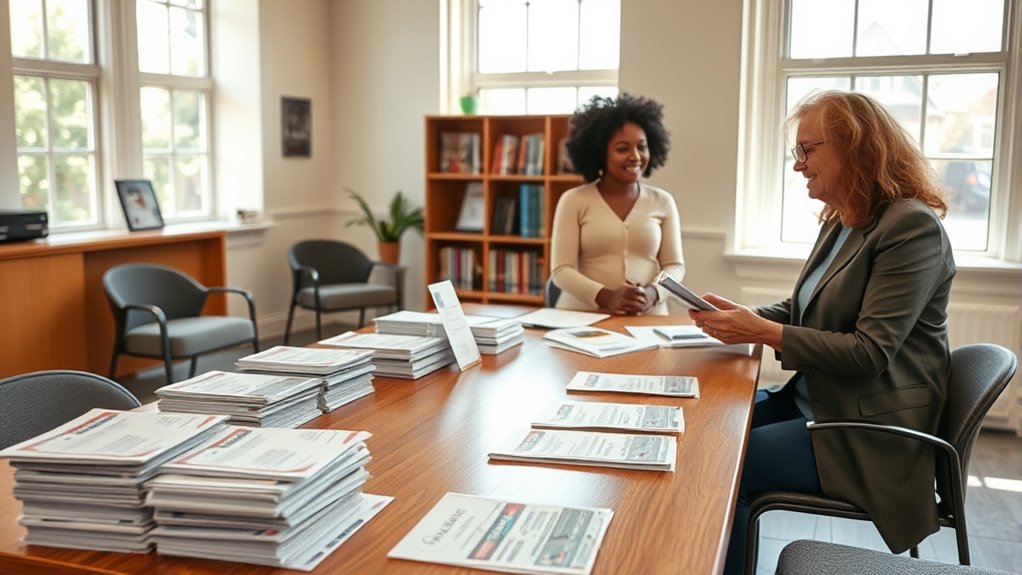If you’re seeking free or low-cost legal help for divorce, several options are available. Legal aid organizations and clinics offer free consultations, advice, and representation tailored to your income level. Community clinics staffed by volunteers can help with legal forms and guidance, while online resources provide templates and step-by-step instructions for uncontested divorces. Government and courthouse resources also include guides and workshops. Continue exploring these options to find the support you need for your divorce journey.
Key Takeaways
- Legal aid organizations offer free consultations and representation for eligible individuals facing divorce issues.
- Community legal clinics provide sliding scale or free services, staffed by volunteers or law students.
- Online legal resources offer free guides, templates, and step-by-step instructions for divorce filings.
- Government and nonprofit websites supply current, jurisdiction-specific legal guides and court forms for self-represented litigants.
- Self-help centers and court resources help individuals understand procedures, access legal forms, and prepare for court appearances.

Are you wondering where to find reliable legal resources to steer your divorce? When facing this challenging time, it’s vital to access accurate information and support, especially regarding custody agreements and property division. Luckily, there are free and low-cost legal resources available that can guide you through the process without breaking the bank.
Legal aid organizations and clinics are excellent starting points. These services are designed to help individuals who can’t afford private attorneys. Many legal aid societies offer free consultations, advice, and even representation for issues related to custody agreements and property division. They understand the complexities involved in divorce cases and can provide you with tailored guidance. For instance, they can help you understand what to expect during custody negotiations, how to present your case effectively, and what factors courts consider when determining custody arrangements. Similarly, they can assist with property division by explaining your rights and helping you gather the necessary documentation to support your claims. Having access to experienced legal assistance can make a significant difference in your case.
Legal aid services offer free guidance on custody and property division for those unable to afford private lawyers.
Community legal clinics also serve as valuable resources. These clinics often operate on a sliding fee scale or offer free services to low-income individuals. They typically have volunteer attorneys or law students who can answer your questions and help prepare legal documents. Attending a clinic can clarify what steps you need to take to protect your interests, especially when it comes to dividing assets and ensuring your custody rights are respected. They can also direct you to additional resources, such as court forms, local procedures, and support groups.
Online legal resources are another practical option. Many government websites and nonprofit organizations provide free guides and templates for divorce paperwork. These resources can help you understand the legal process, prepare initial filings, and learn about your rights regarding custody agreements and property division. Be cautious, though, to verify that the information is current and relevant to your jurisdiction. Additionally, online guidance can be helpful in understanding the specific procedures and requirements for uncontested divorces, which are often more straightforward and faster to resolve.
Finally, some courts offer self-help centers where you can access legal forms, attend workshops, and receive guidance on steering divorce procedures. These centers are designed to empower you with the knowledge needed to handle your case confidently. They can be especially helpful if you’re representing yourself and need to understand legal terminology or court expectations. Utilizing these resources can improve your understanding of the process and help ensure you’re well-prepared when navigating your divorce case.
Frequently Asked Questions
How Do I Qualify for Legal Aid Services?
To qualify for legal aid services, you need to meet specific eligibility criteria, which often include income limits and household size. You should start by researching your local legal aid organization’s application process, which typically involves filling out an application form and providing proof of income and residency. If you meet the criteria, your application will be reviewed, and you may be scheduled for an interview or further documentation.
Are There Online Legal Clinics for Divorce Help?
Yes, there are online legal clinics that offer divorce help. You can often access virtual consultations where attorneys provide advice and answer your questions. Many of these clinics also assist with legal document prep, guiding you through the necessary paperwork for your divorce. These services are convenient and accessible, making it easier to get legal support without in-person visits. Be sure to check their availability and specific services offered online.
Can I Access Free Legal Resources if I’M in a Different State?
You can access free legal resources even if you’re in a different state by exploring state-specific resources and interstate legal aid programs. Many states offer online legal clinics and free consultations accessible remotely. Check with local legal aid organizations or bar associations in your state—they often provide guidance or referrals. While services vary, you may find interstate legal aid options that connect you with the help you need across state lines.
What Documents Do I Need to Bring to a Legal Clinic?
When you go to a legal clinic for divorce, you’ll need to bring your divorce paperwork and other required documents. These often include your marriage certificate, proof of income, and any relevant court documents. Make sure to verify beforehand for specific requirements, as each clinic may have different needed documents. Being prepared with all necessary paperwork helps the process go smoothly and ensures you get the help you need.
How Long Does It Typically Take to Get Legal Aid Assistance?
Waiting for legal aid assistance is like waiting for a pot to boil—you might feel impatient. Typically, the process can take anywhere from a few weeks to a few months, depending on your location and case complexity. It’s best to contact the legal aid organization early and ask about their appointment scheduling and waiting periods. Being proactive helps make certain you get the help you need without unnecessary delays.
Conclusion
Accessing free or low-cost legal resources can make divorce less overwhelming. Did you know that nearly 60% of low-income individuals qualify for legal aid? By exploring clinics and legal aid organizations, you can get the support you need without breaking the bank. Don’t hesitate to reach out—these resources are designed to help you navigate your divorce confidently and affordably. Remember, you’re not alone in this, and help is available.










